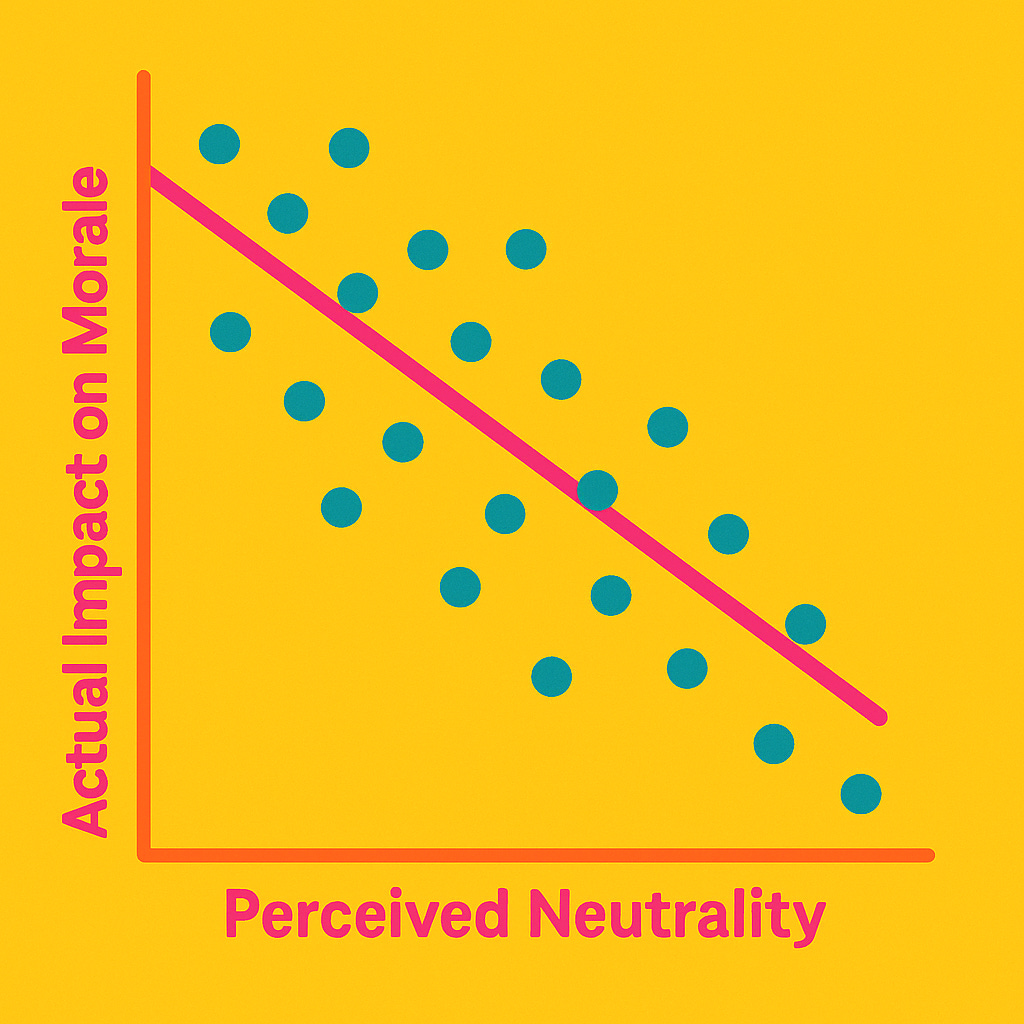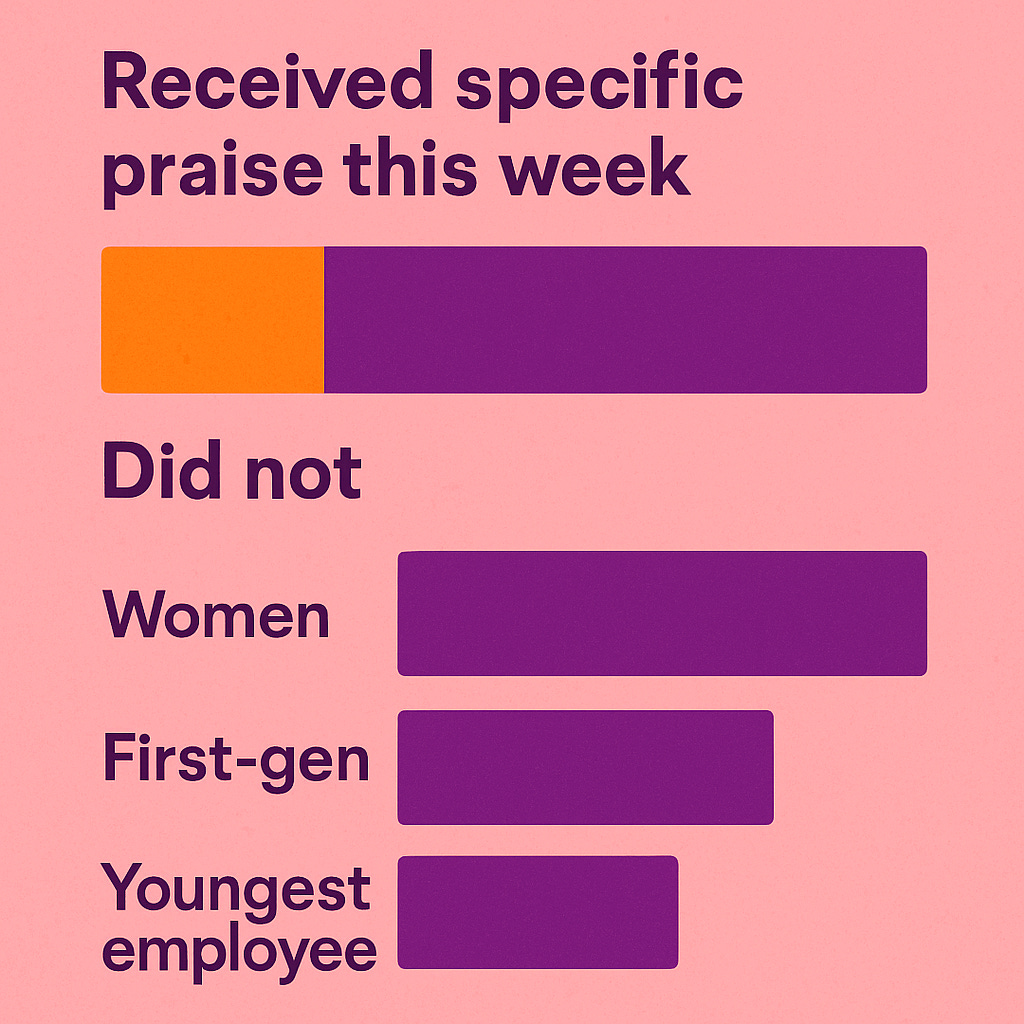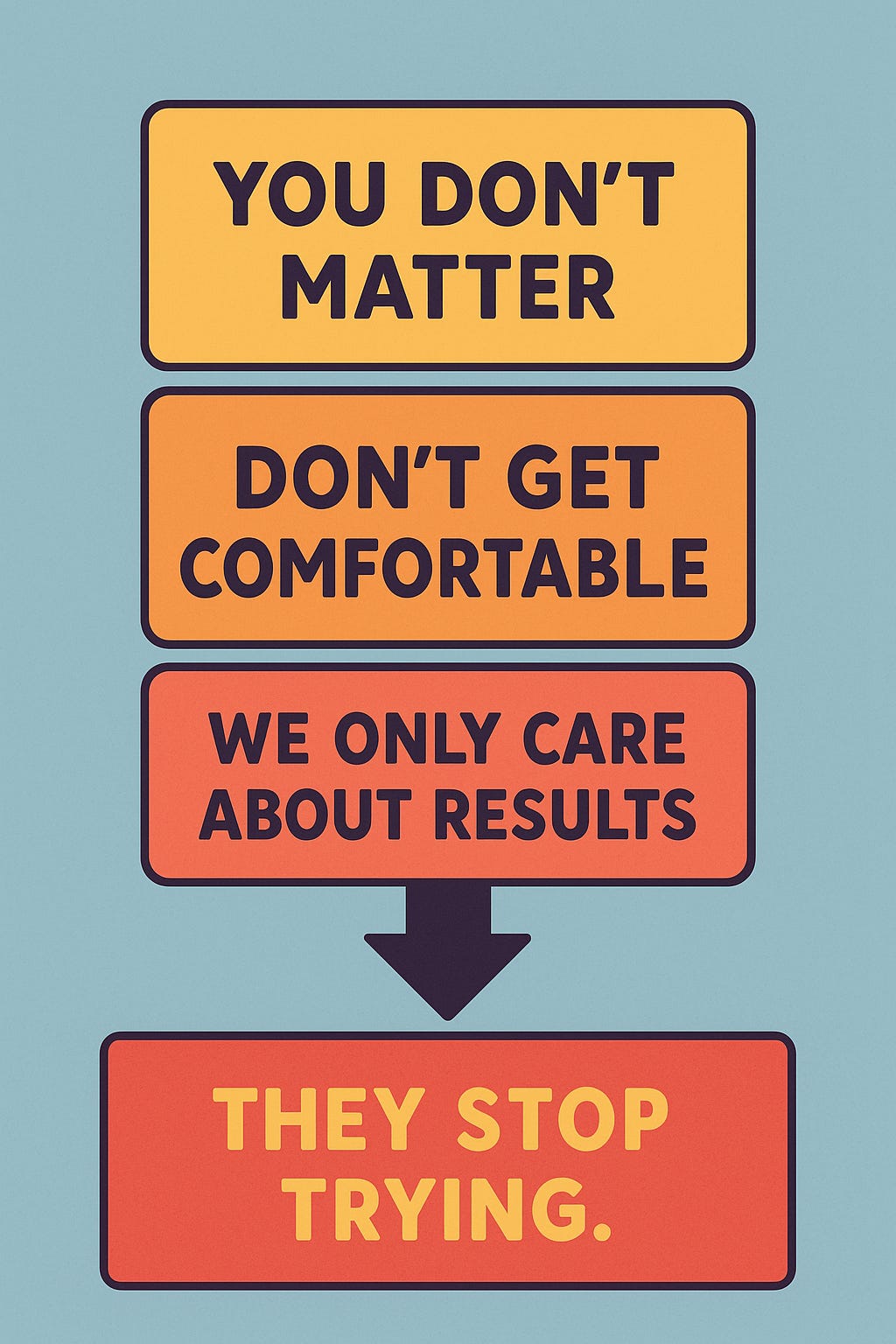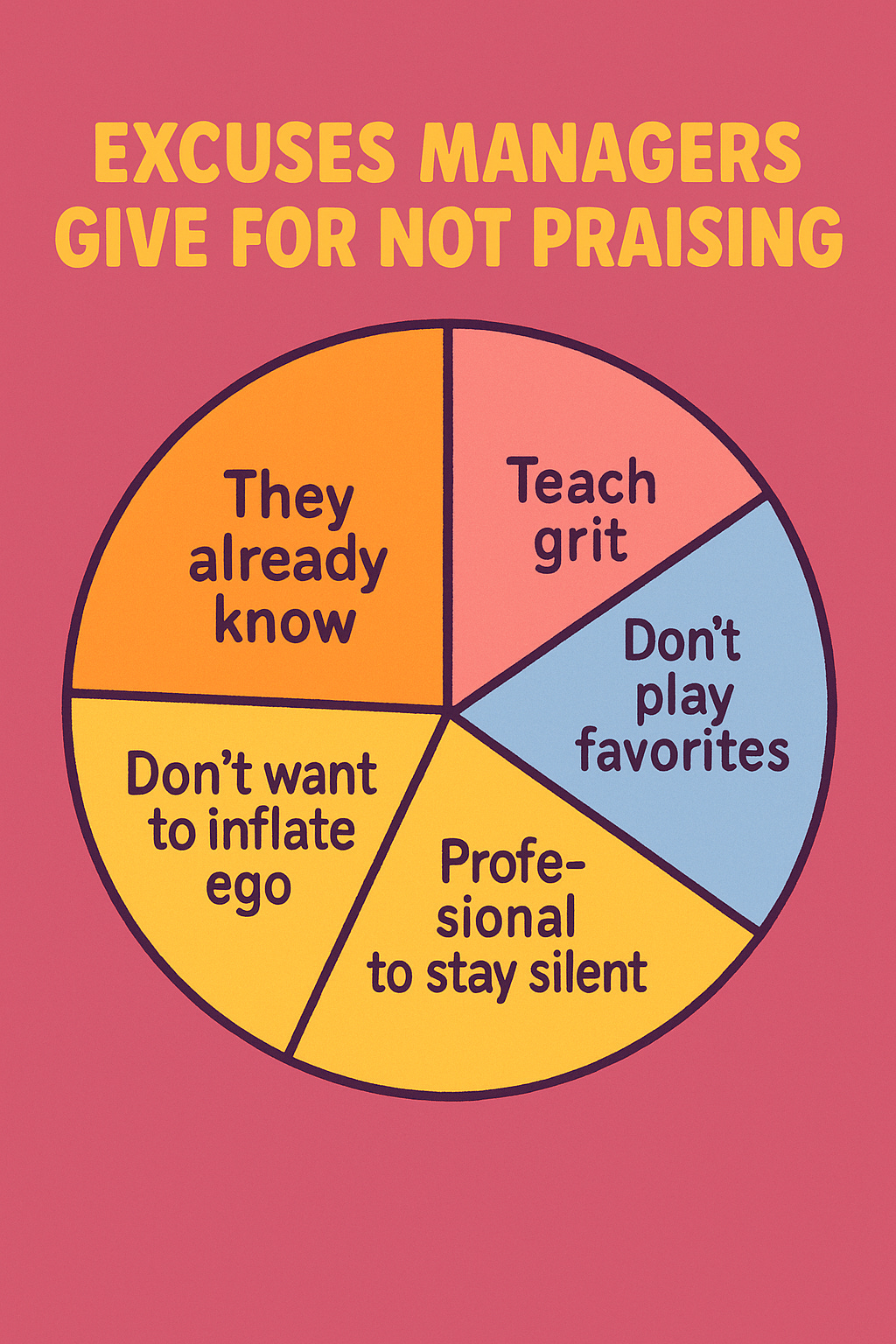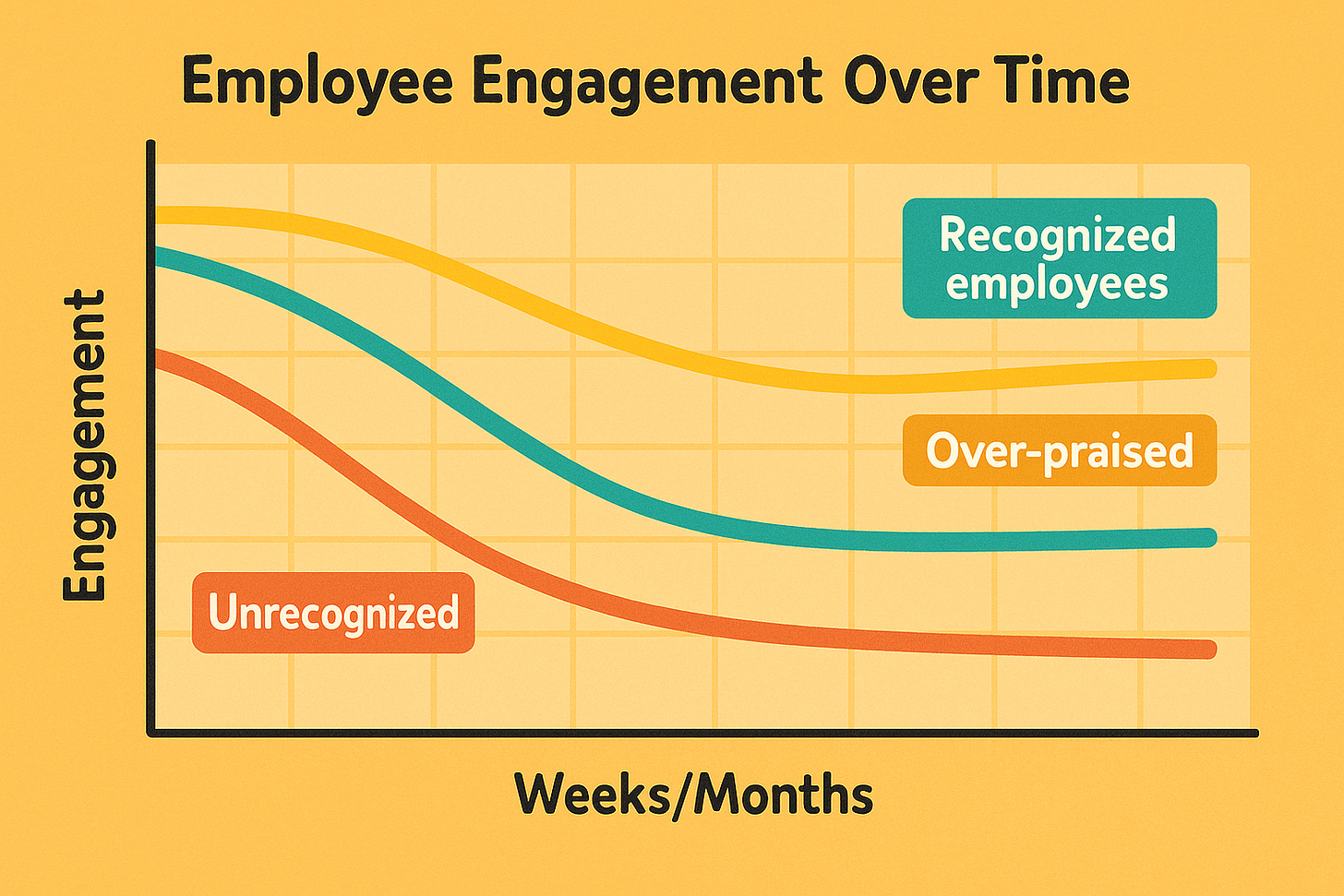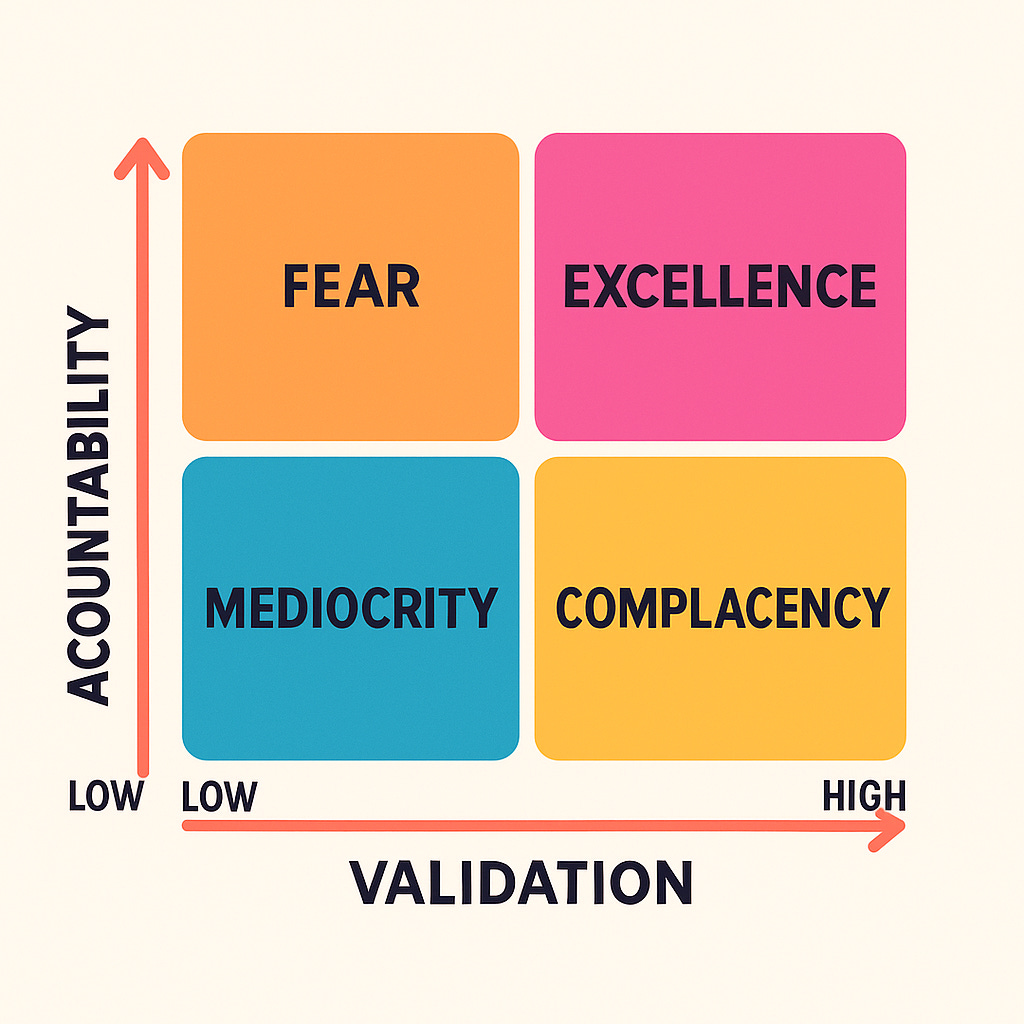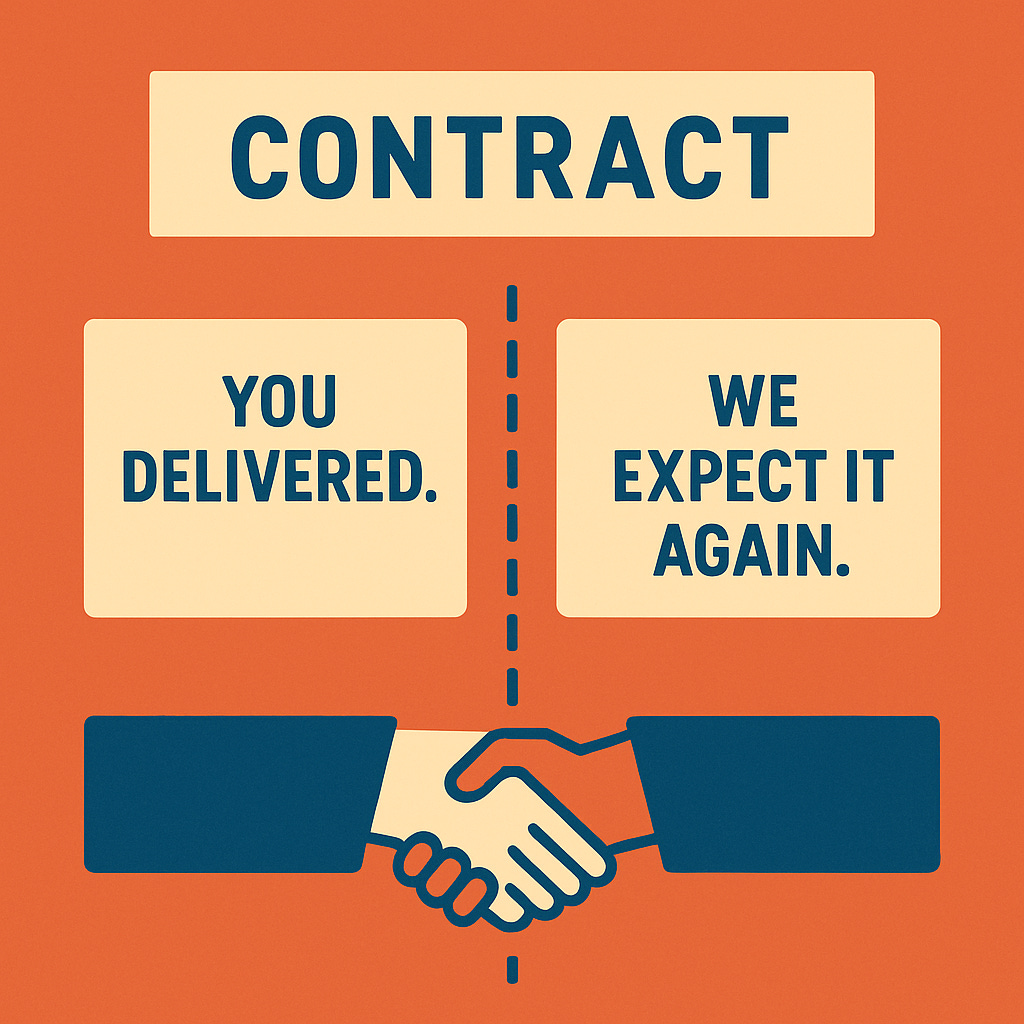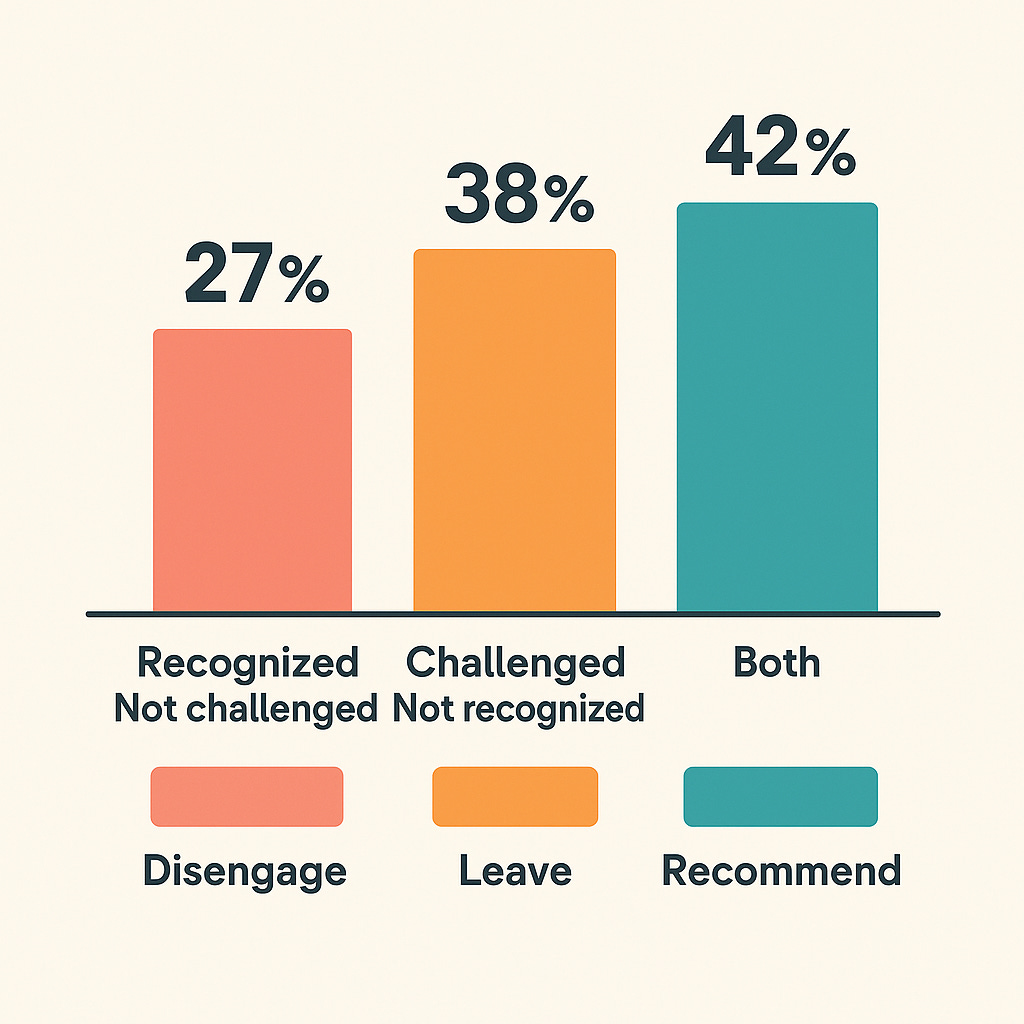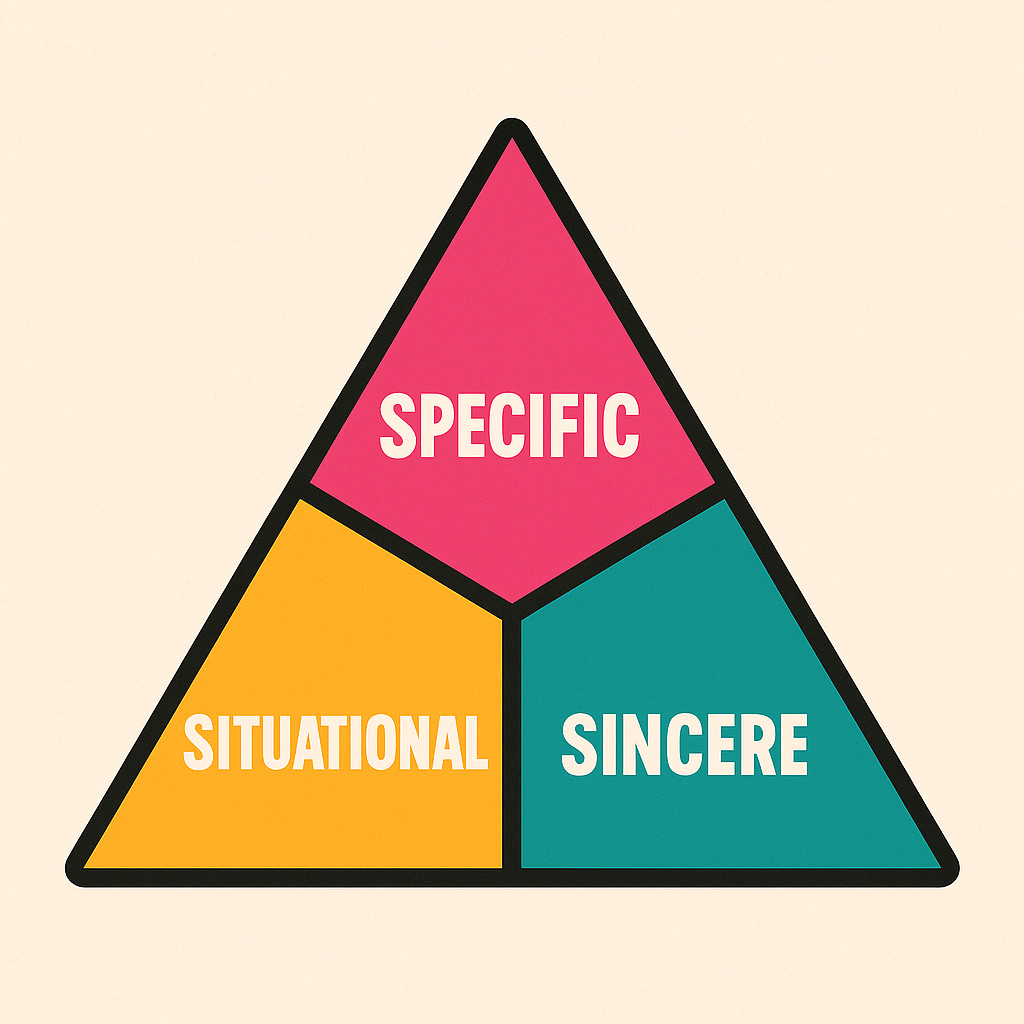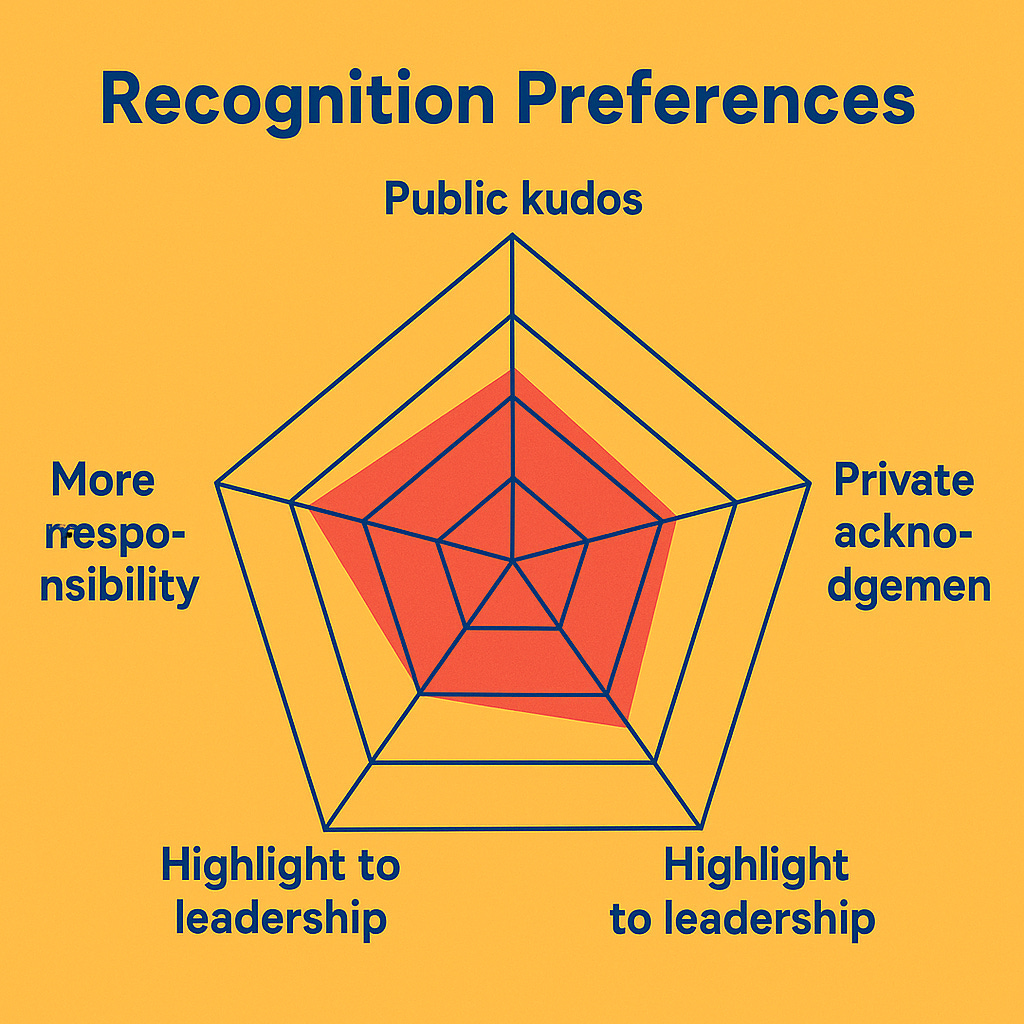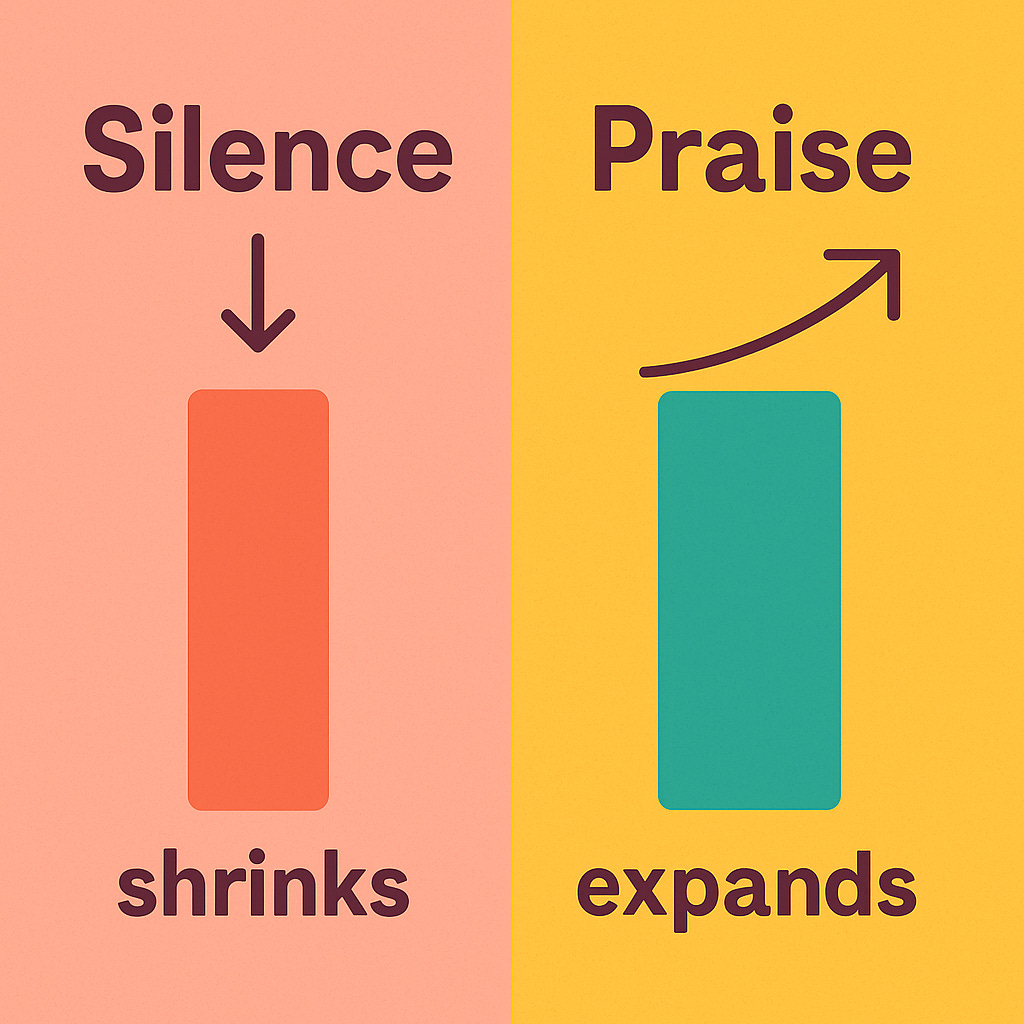Sunday Longread: Stop Starving Your Team. Praise Is a Leadership Skill.
Stop pretending silence is neutral.
You probably think this is about being nicer. It’s not.
You already know praise is “important,” whatever that means. You’ve probably convinced yourself you already do enough of it. You nod and smile when your team hands you work. Maybe you toss in the occasional “good job” or a thumbs-up emoji in Slack.
And you think that’s enough.
It isn’t.
So let me ask you something. When was the last time you gave someone on your team specific, sincere, unmistakable praise? The kind of feedback they could actually hold onto and believe? Not just “looks great”, but “your ability to reframe that client objection on the fly saved the account. That level of calm is rare and makes you indispensable.”
When was the last time you said that?
If you can’t remember, this is for you.
If you can, it’s still for you. Because you’re not doing it nearly enough.
Here’s what the data says. Gallup found just 1 in 3 workers worldwide strongly agree they’ve received praise in the past week. That means 2 out of 3 people end friday not knowing if their work even mattered. Wondering if anyone noticed how much they tried.
And it’s not random who gets left out.
It’s almost always:
women, drowning in invisible work nobody measures but everyone benefits from.
The youngest person in the room, desperate to prove herself but invisible to you because she doesn’t yet “sound like leadership.”
The quiet one carrying his whole family on his back, too humble to draw attention.
The first-gen kid terrified to ask how he’s doing because he assumes the answer is bad.
And you? Even if you think you’re above it? You’re part of that silence.
Your silence isn’t neutral. It’s policy. You inherited it, and now you enforce it.
You probably remember the first time you learned silence was the norm.
I do.
I was 21, working my ass off on a deck that would make my boss look good. I stayed late, skipped dinner, ran creative risks I thought she’d love.
She flipped through it silently and said: “This’ll do.”
No feedback. No thank-you. No acknowledgment of the weekends I’d poured into it.
And in that moment, I learned what most of us do early: Don’t expect applause. Don’t expect recognition. Just shut up and work.
And so I did. I kept my head down.
When I became a manager, I kept doing the same to my team. Not because I was cruel. Because I thought that’s what leadership looked like.
And then one day, someone quit.
And in their exit interview, they said: “I just never felt seen here.”
That gutted me. Because I had seen them. I just never said it out loud.
Silence teaches people three things:
You don’t matter.
Don’t get too comfortable.
We only care about the result, not the person.
And here’s the ugly truth: they believe it. They stop trying. They stop caring. They stop staying.
You tell yourself they should just know you appreciate them.
But they don’t. Nobody’s a mind reader. And nobody should have to be.
Praise is not charity. It’s not “nice-to-have.” it’s the scaffolding that keeps the whole structure from falling apart.
And you’re starving your team of it.
You don’t have to. You just have to stop pretending silence is neutral.
Because it never is.
Why Managers Hoard Praise (And How To Break That Reflex)
You see your team deliver something great.
You even think, for a split second: “Nice. That’s exactly what I needed them to do,” and then you say… nothing.
Or worse, you mutter a distracted “good work” while you’re already opening your next email.
And you think that’s fine. You think you’ve done enough.
Why?
Because you’ve convinced yourself staying quiet is principled.
You tell yourself things like:
They already know I appreciate it.
I don’t want to inflate their ego.
I don’t want to seem like I’m playing favorites.
I don’t want to interrupt the flow of work.
I don’t want to look soft in front of the rest of the team.
Sometimes you even dress it up as “teaching them grit.” You tell yourself you’re building resilience, that they should be intrinsically motivated, and that praise makes people complacent.
All of that is bullshit.
And if you’re being honest, you know it.
Because that knot in your stomach when you think about saying something kind? That has nothing to do with them. That’s about you.
You learned to hoard praise because someone hoarded it from you.
You learned to treat it like a scarce resource because nobody ever gave you enough of it when you were coming up.
You learned to survive on silence. And now you expect everyone else to do the same.
That reflex isn’t about standards. It’s about fear.
Fear they’ll get cocky. Fear they’ll stop trying. Fear they’ll outshine you.
Fear to admit you need them as much as they need you.
Fear to be vulnerable enough to say: “I see you. And you matter here.”
Here’s what nobody told you when you learned to hoard it: Praise doesn’t make people lazy.
It doesn’t make them weak. It makes them loyal. It makes them better. It makes them stay.
Every study we have- Gallup, Deloitte, SHRM- shows this over and over.
Specific, sincere praise strengthens accountability and raises standards.
Because praise isn’t an indulgence. Praise is information.
It’s how people learn what good looks like. It’s how they know which behaviors to repeat. It’s how you build expectations that actually stick.
So here’s how to break that reflex, right now:
Name your own scarcity script (sit down and actually write this down):
In my first job, praise looked like…
When I do good work now, I expect…
When someone praises me, I feel…
I hesitate to praise others because…
One person I still wish had told me “well done” is…
That little ache in your chest while you answer? That’s the point. You’re carrying someone else’s silence into every room you lead. See it for what it is.
Remind yourself: Praise is not a reward. It’s a signal.
You’re not giving away candy for good behavior. You’re marking the moment someone met the standard you want everyone else to aim for.
Start noticing
Commit to noticing one thing a day. Say it out loud. Don’t let the moment pass.
You’ll feel awkward at first. Good. That means you’re unlearning something corrosive.
Because the longer you let that reflex live, the more damage it does to your team, to your culture, and to you.
You don’t have to keep reenacting someone else’s mistakes. You can stop being the manager who leaves people guessing. You can stop making your team earn scraps of dignity.
But only if you stop clenching your fist around something that was never scarce in the first place.
Say it. Today. Out loud.
And watch what happens when you do.
What Silence Does To Your Team, Your Culture, and You
Silence has a cost. You just don’t see it right away.
You tell yourself your team knows you appreciate them. You assume they feel recognized. You believe your silence is “professional,” or “neutral,” or just how things are done.
But silence isn’t neutral. It’s corrosive. And the damage shows up in three places: your people, your culture, and you.
Your people stop trying
Think about the last time you poured yourself into something and nobody noticed.
You worked late. You solved the hard problem. You saved the day.
And then… nothing. No thanks. No acknowledgment. Just another task on your plate.
How long did it take before you stopped raising your hand? How long before you decided it wasn’t worth the effort?
That’s what happens to your team every time you stay quiet.
First, they stop volunteering for stretch projects. Then they stop taking creative risks. Then they stop trusting you. Then they stop caring. Then they stop staying.
Gallup data shows employees who feel unrecognized are twice as likely to quit in the next year. 3x more likely to “quiet quit.” 25% less productive than their peers.
And don’t delude yourself with “but they never complain.” The ones who look “fine” are often already interviewing elsewhere. And the ones who stay just disengage. They give you the minimum. They save their best for someone who’ll actually see it.
You don’t even realize how much talent you’re bleeding out of the room until it’s too late.
your culture rots silence doesn’t just kill individuals. It poisons the whole team.
When people see that nobody’s effort ever gets acknowledged, they stop bothering.
They aim lower. They play it safe. They gossip instead of building. They hoard instead of sharing.
Mediocrity becomes the unspoken norm.
Mckinsey found that in companies where employees reported “low recognition,” discretionary effort dropped by 38% and productivity fell 24% over two years.
You get what you signal you care about.
If you only ever talk about mistakes? People play not to lose.
If you never call out brilliance? People stop aiming for it.
By the time you notice the cynicism and apathy in the air, it’s already baked into the culture. And good luck clawing that back once it’s set in.
You shrink too
And here’s the part you don’t want to admit: your silence doesn’t just damage them. It damages you.
Every time you swallow the words you should have said, every time you see someone shine and say nothing, you’re signaling something about yourself too: that you’re too small to give someone else the light.
That you’re too scared to admit you need them. That you don’t even believe in the power of your own words.
You shrink the trust in the room. You shrink the standard you want them to reach. You shrink yourself.
Leadership isn’t just about metrics and milestones. It’s about what people say about you when they walk out of your office:
“She made me better.”
“He made me feel like I belonged here.”
Silence can’t buy you that.
So stop telling yourself you’re keeping people “hungry.” You’re just starving them. Nobody stays loyal to someone who starved them.
You already pay the cost of silence, every day, in ways you pretend not to see.
Morale. Turnover. Mediocrity. Missed opportunities. Burned bridges.
You can stop paying it. But only if you start saying what you see before it’s too late.
How To Wield Praise As A Lever For Accountability And Loyalty
Most managers think praise is just about making people feel good.
It isn’t.
Done right, it’s about making them better.
People don’t actually want to be coddled. They don’t want empty approval. They want to be seen for what they’re already capable of and trusted to keep delivering.
Good praise isn’t a pat on the back.
It’s a contract.
You’re saying: “I saw what you did. It mattered. I expect to see that level from you again.”
That’s where accountability and loyalty converge.
And most managers screw this up in one of two ways.
Mistake #1: validation without accountability
We’ve all seen the “cheerleader” manager.
Everything is “fantastic.” Every deck is “brilliant.” Every teammate is “amazing.” Sounds nice. Feels hollow.
After a while, nobody believes it.
And nobody actually knows what they did right or how to repeat it.
Validation without accountability breeds complacency.
People start treating your praise like white noise.
They stop pushing themselves, because it seems like you’ll approve of anything.
That’s why good praise has to be specific. And it has to name why it mattered.
Bad praise: “great work on that deck.”
Good praise: “your deck anticipated every client question. That level of preparation kept the meeting on track. That’s the bar I want to see every time.”
See the difference? One is nice. The other is useful.
Mistake #2: accountability without validation
Then there’s the other type: the “critic.”
They push. They polish. They pick apart.
And they think silence means people know they’re doing fine.
Wrong.
When you never say what someone’s getting right, they stop trusting your judgment.
They stop trusting you. Eventually, they stop trying.
Fear can get compliance. But it doesn’t get excellence.
Validation gives people the confidence to try again.
Accountability gives them the reason to try harder.
You need both.
The sweet spot: the performance contract
When you get this right, praise becomes more than a feel-good.
It becomes a performance contract.
You’re saying: “You’ve shown me what you’re capable of. I trust you to keep operating at that level.”
That’s what keeps high performers engaged.
They feel trusted. Challenged. Clear on the standard.
And they want to rise to meet it.
One of the best managers I ever had never said “good job” casually.
When she praised me, it was surgical: specific, tied to impact, and always with the expectation that I’d keep delivering at that bar.
It didn’t feel punitive. It felt like respect.
That respect is sticky.
Why this builds loyalty, too
A Deloitte India study found that:
Employees who felt recognized but not challenged were 27% more likely to disengage.
Employees who felt challenged but not recognized were 38% more likely to leave.
Employees who felt both were 42% more likely to recommend their workplace to others.
Loyalty doesn’t come from perks. It doesn’t even come from paychecks.
It comes from knowing you’re doing meaningful work, for someone who sees you and expects your best.
Good praise names what someone did right, why it mattered, and sets the bar higher. Done consistently, it builds not just trust but commitment.
You’re not just thanking them for who they’ve been. You’re investing in who they can become.
And they’ll remember you for that long after the quarterly targets are forgotten.
How To Actually Praise Well: Frameworks, Scripts, Mistakes To Avoid
By now you get it: silence is corrosive. Generic praise is useless. And good praise is power.
But most managers still fumble it.
They either overdo it, underdo it, or just… phone it in.
You can do better. Here’s how.
The 3S framework: specific, situational, sincere
Bad praise is vague and forgettable.
Good praise is:
Specific: name exactly what they did.
Situational: tie it to the broader impact.
Sincere: mean it. People can smell fake a mile away.
Bad: “great job, team!”
Good: “the way you stayed calm during the client escalation today, and outlined actionable next steps, is exactly what kept the account on track. That’s the presence this team needs.”
That’s the kind of praise people carry with them into the next hard day.
Tailor it to their “praise language”
Not everyone wants to be recognized the same way.
Some love public kudos. Others prefer quiet, private acknowledgment.
If you don’t know how someone prefers to be recognized? Ask.
You’ll hear things like:
“I appreciate it when you call it out in the team meeting.”
“I’d rather you just tell me 1:1.”
“I love it when my work is highlighted to senior leadership.”
“Just give me more responsibility next time.”
Match your style to theirs. Don’t assume.
Make it a ritual, not an afterthought
Waiting for annual reviews or milestones to say something is too late. If you want praise to actually shape behavior, it has to be frequent and cultural.
Start small:
Open every stand-up with a “win of the week.”
Create a slack #kudos channel where anyone can shout out anyone else.
Make yourself a weekly checklist: did I recognize at least 3 people this week?
Gallup found employees who get recognized at least once a week are 3× more engaged.
Common mistakes to avoid
The compliment sandwich
Don’t pair praise with criticism just to soften the blow.
“Great work, but you forgot this. But overall good.”
That’s manipulative. Separate feedback from recognition.
Overpraising mediocrity
Don’t applaud everything. Not every little thing deserves a parade. Save praise for meaningful, value-aligned actions. Otherwise, it starts to feel cheap.
Reinforcing bad behaviors
Don’t thank people for staying till midnight like it’s heroic.
Instead say: “Thanks for finding a way to solve this. Let’s plan better next time so you don’t have to burn yourself out.”
Favoritism
Don’t only praise your loudest or most senior people. Track who you’re recognizing over time and check your bias.
10 ready-to-use praise scripts
If you feel awkward or rusty, steal these to start:
“You reframed that client objection perfectly, it turned the whole conversation around. Do more of that.”
“Your draft caught risks I hadn’t even thought of. That kind of foresight saves us mistakes.”
“Your calm presence during that fire drill kept everyone focused. Invaluable.”
“You supporting your teammate quietly in the background didn’t go unnoticed.”
“That presentation set a new standard for polish. Everyone should study it.”
“You turned critical feedback into a stronger product. That’s growth.”
“The way you mentored the intern shows real leadership potential.”
“Your brainstorming idea opened a new direction for us.”
“You’re the one who holds all of this together. Don’t think I don’t see it.”
“I trust you with high-stakes projects because of how you deliver. Keep proving me right.”
Recognition Beyond Words
Sometimes words aren’t enough.
Consider:
Highlighting them in front of senior leadership
Giving them a stretch assignment or promotion
Nominating them for an award
Letting them lead the next big project
Inviting them to mentor others
The form doesn’t matter as much as the signal.
What matters is they walk away knowing: “They saw me. And they expect more from me.”
That’s what good praise does. So stop fumbling it.
You don’t need to overthink it. You just need to notice and say it.
Every time you do, you’re not just recognizing their past, you’re underwriting their future.
The Middle Manager’s Power, And Why You Don’t Need Permission To Fix The Culture
You think you can’t fix this because you’re “just” a middle manager.
You’re wrong.
Middle managers aren’t just the awkward layer between strategy and execution. You are the culture whether you like it or not.
People don’t quit companies. They quit managers.
They don’t stay because of logos. They stay because someone made them feel like they belonged.
And that someone is you.
Gallup data shows that 70% of the variance in employee engagement comes down to the manager they report to. Not the CEO. Not HR. You.
You’re the one they see every day. You’re the one who notices who stayed late. You’re the one who sees who kept their cool in the crisis. You’re the one who clocks the quiet kid mentoring the intern when nobody’s watching.
You see it.
You can say it.
You just don’t.
Why? Because you’ve convinced yourself it’s “not your job,” because you think if the company doesn’t value recognition, you can’t either.
Because you’re waiting for someone above you to fix the culture.
That’s cowardice.
Your team doesn’t care what HR puts in the slide deck.
They care about how you show up for them every day.
You’re senior enough to set expectations. You’re close enough to the work to seethe effort. You’re trusted enough to advocate for your people both up and down the chain. You’re perfectly positioned to change everything in your corner of the org chart.
And here’s the kicker: you don’t even need to fix the whole company.
You just need to make your team a place people want to be. A place where people feel proud of what they’ve built.
A place where they’d tell a friend: “you’re lucky if you end up on her team. She’s got your back.”
You know how people whisper that in the hallways? You can be that manager.
You should be that manager. And you don’t need permission to do it.
Why your influence is bigger than you
Your team talks.
To each other.
To people on other teams.
To people outside the company.
Every bit of loyalty you earn ripples outward. Your team’s retention makes you look like a leader worth promoting. Your team’s output sets the standard for others to follow. Your team’s morale becomes a quiet argument against cynicism.
It’s easy to blame “the system.” and yeah, the system is broken.
But you inherited a culture of quiet suffering. You don’t have to keep passing it on.
Stop waiting for someone else to fix it. Stop hiding behind your scars. Stop pretending you don’t have a say.
You already have the power. Pick it up.
Commit, right now, to doing three things next week:
Publicly recognize one person.
Privately thank one person who never gets thanked.
Notice and name one good thing someone on your team did that nobody else saw.
Because every time you do, you’re proving something bigger: that you understand what leadership actually is.
It’s not about the title. It’s not about the authority.
It’s about how people feel after working under you.
You can either perpetuate the silence you grew up in. Or you can break the cycle.
You decide.
Justice, Dignity, And Choosing Abundance
You thought this was about praise. It never was.
This is about dignity.
About the quiet contract you signed the day you became responsible for other people: if they’re going to give you their trust, their time, their best hours and their sharpest ideas, you owe them more than a paycheck. You owe them the decency of being seen.
And yet most of us learned to starve each other.
We grew up on scraps of validation. We learned that silence was strength. We learned to ration our approval like it was gold. We learned to save our kind words for when people were perfect.
And what did that make us?
Small. Petty. Lonely.
When you withhold recognition, you’re not just hurting them.
You’re shrinking yourself.
Every time you bite back the words, every time you see someone rise to the moment and you say nothing, you’re making yourself smaller.
You’re shrinking the trust in the room.
You’re shrinking the culture you’re meant to tend.
And worse, you’re shrinking the person in front of you.
You’re teaching them not to expect much. You’re teaching them that doing their best won’t matter. You’re teaching them to stop trying.
Is that really the kind of leader you wanted to be? Is that the kind of legacy you want to leave?
Because make no mistake: people remember.
They remember who made them feel like more than a cog. They remember who made them feel like they belonged. They remember who made them bigger. And they remember who kept them small.
Leadership isn’t about metrics. It isn’t about quarterly targets.
It isn’t about managing up or playing politics.
It’s about the people who say your name with quiet gratitude years later and think: “That was the manager who made me believe I could do more. That was the person who made me bigger.”
And you only earn that by choosing abundance.
By seeing what’s good and saying it out loud. Not once. Not just at performance reviews.
Every day.
And don’t tell yourself “But if I say something, they’ll get complacent.”
That’s just scarcity talking. That’s just your own hurt talking.
Praise is not finite. You don’t run out by giving it. In fact, the more you give, the more you get.
In trust. In loyalty. In better work. In better people.
Every moment you notice someone and name what you see, you widen the world a little.
You make them feel like there’s more space here to grow. You make yourself into someone worth following.
And you don’t need permission to start. You don’t need a policy.
You just need to look up.
Today. Right now. Find someone. Say what you see. Say it like you mean it.
Watch what happens.
Because somewhere down the line, someone’s going to say your name and mean it. And that, more than money, more than titles, more than milestones, is what stays.
If silence is all they’ll remember you for, you already failed.



